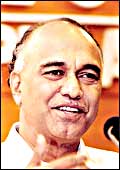 |
| Chief Minister V.S. Achuthanandan addresses
party workers (above) and protesters vent their ire at Coca-Cola |
 |
SEPTEMBER
11, 2006
6 p.m. Technopark, Thiruvananthapuram
Fifteen
kilometres from the secretariat, where the 84-year-old Chief Minister
V.S. Achuthanandan works from a large, sparsely decorated high-roofed
office, Kerala's growing it prowess is in full display. Hundreds
of techies who work in the air-conditioned offices of it companies
in the 147-acre campus are heading out for the day, some to the
buses and cabs that will take them home and others to the food
court for a leisurely coffee. This is the new and pro-business
face of Kerala, where every large it czar is queuing up for space
to escape the unmanageable growth of larger cities such as Bangalore,
Delhi and lately Chennai. Land rates and rentals are low and traffic
is almost non-existent compared to the hour (or more) that most
code-jocks spend in Bangalore's rush hour traffic. "Kerala
is the best place to work in the country," declares V.K.
Mathews, a home-grown entrepreneur who has seen his software product
company, IBS, survive two meltdowns (first the tech bubble burst
and then 9/11) and has just seen his headcount cross 1,000 a few
days ago.
It isn't just local entrepreneurs heaping
praise on Kerala's growing it prowess, but multinationals too
are queuing up for space in the already choc-a-bloc Technopark
or to set up independent campuses in its vicinity. "Kerala's
reputation has improved dramatically since we opened here in 2003
and facilities here are comparable to the rest of the country,"
says Rakesh Kumar Gupta, coo, Allianz Cornhill Technology India,
a captive it and BPO centre for the UK-based insurance giant.
But there's trouble brewing elsewhere in the state. Coca-Cola
(whose bottling unit in North Kerala was shuttered 30 months ago)
and Pepsi have both had their flagship colas' sale banned (both
are appealing), and tech giant Microsoft is on the verge of being
shown the door in favour of free software. "Both Pepsi and
Coke had pesticide levels 30 times the permissible limit and we
banned their sale to safeguard public health," Vishwas Mehta,
Kerala's Health Secretary, tells BT. The cola companies have a
different story to tell. "We have the same uncompromising
commitment to product safety and quality in our beverages in India
that we offer around the world," says Vikas Kochhar, a Coca-Cola
India representative.
While Achuthanandan may have a long-standing
dislike for cola giants and seems to have entered into a very
personal battle against them, the opposition has been quick to
pounce on the LDF administration's shortcomings. "The current
government is self-contradictory and is unwilling to explore new
ideas for the betterment of the state and its people," thunders
C.P. John, who heads the Communist Marxist Party, ironically one
of two left-leaning parties in the opposition United Democratic
Front. "We are all for investors as long as there is a benefit
to the people of the state, but we will not allow people to use
the state's resources for their personal gain," Achuthanandan
tells this writer in his Secretariat office.
 |
 |
| Kerala's Industries Minister, Elamaram
Kareem (left), says that the state is not anti-business, and
indeed there are some, like tech entrepreneur V.K. Mathews,
who swear that "Kerala is the best place (to do business)
in the country" |
|
|
The other act of state-sponsored defiance
against big business is evident a couple of kilometres from the
city centre in a state-run high school, where students are contributing
their two bits to the government's anti-business stance, by learning
free software, instead of Microsoft's Windows operating system.
According to a recent diktat from the state's Education Minister
M.A. Baby, students across 2,650 government and government-aided
high schools will now cut their teeth on free software rather
than get Windows. "Kerala will be the free software destination
of India," Baby tells this writer, even as he prepares to
roll out this ambitious initiative state-wide. Education department
officials put down this move to a recent visit by free software
maven Richard Stallman, who made a forceful case for the move,
and Achuthanandan's long-standing antipathy for Microsoft.
According to Microsoft officials, however,
using paid and proprietary software has its own advantages and
the company has even rolled out cheaper packages keeping in mind
the education segment. Rohit Kumar, Country Head (Public Sector),
Microsoft India, says, "Microsoft has a long-term vision
towards the cause of it education. Microsoft has successfully
created a competitive pricing model and Windows XP Pro is available
to them at an estimated retail price of $25-$30 (Rs 1,175-1,410)
per desktop."
Kerala's anti-business perception isn't from
these two incidents alone. The Rs 2,200-crore Vallarpadam Trans-shipment
Container Terminal and the ambitious Dubai Internet City (DIC)
appear to be in limbo, with a furious blame game in progress between
the current and previous governments. "The Kerala Government
is not anti-business; DIC will happen, and we will sign a final
mou in October," claims the state's Industries Minister Elamaram
Kareem. He's quick to add that many proposals have been green-signalled,
including a 1,000-acre food processing zone in Waynad, a 260-acre
industrial centre in Kannur and the purchase of 162 acres of land
to upgrade the Kozhikode Airport. "Investors are welcome
to Kerala and we want to change the common perception of the state.
We will undertake a Rs 10,000-crore infrastructure makeover for
Kerala and will set up a separate public sector company for this
purpose," says Kareem. Business, meanwhile, is waiting.
|









